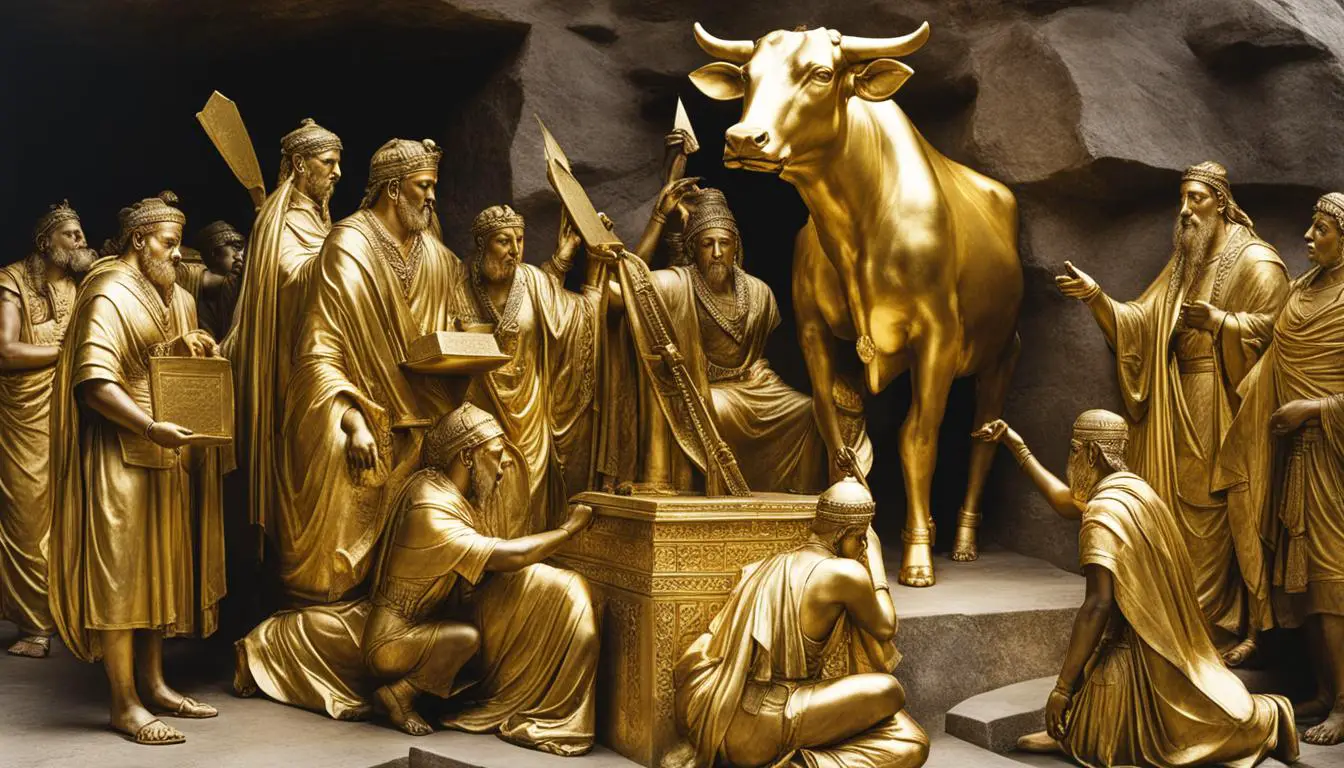Welcome to our in-depth exploration of the biblical understanding of mammon. In the scriptures, mammon refers to material wealth and the pursuit of worldly possessions, often at the expense of spiritual values. In this article, we will delve into the meaning of mammon in the Bible, its etymology in Hebrew and Greek, its presence in various Bible verses, and its significance in today’s world.
Key Takeaways:
- The Bible defines mammon as the pursuit of material wealth and possessions, often at the expense of spiritual values.
- The term mammon has origins in both Hebrew and Greek, pertaining to wealth and the idolatry of money.
- Mammon is mentioned in several Bible verses, emphasizing the incompatibility of serving God and pursuing wealth.
- The cultural context of mammon in biblical times highlighted the dangers of wealth and urged the prioritization of spiritual values.
- Various interpretations exist among biblical scholars regarding the exact nature of mammon, but all agree on its warning against the love of money.
The Etymology of Mammon
The term “mammon” has its origins in both Hebrew and Greek. In Hebrew, it is derived from the word “mamon,” which translates to wealth or treasure. In Greek, it comes from “mammonas,” referring to material possessions and the pursuit of wealth.
The use of the term mammon in the New Testament signifies the idolatry of material wealth and the potential dangers associated with it. It serves as a reminder to prioritize spiritual values over worldly possessions.
“Do not store up for yourselves treasures on earth, where moth and rust destroy, and where thieves break in and steal. But store up for yourselves treasures in heaven, where moth and rust do not destroy, and where thieves do not break in and steal.” – Matthew 6:19-20
In this biblical context, mammon urges individuals to evaluate their relationship with money and consider the eternal value of spiritual riches.
| Origin | Definition |
|---|---|
| Hebrew (Mamon) | Material wealth or treasure |
| Greek (Mammonas) | Material possessions and pursuit of wealth |
Understanding the etymology of mammon provides a foundation for comprehending its significance within the biblical context. It invites introspection and prompts individuals to examine their own attitudes towards wealth and material possessions.
Mammon in the Bible Verses
Several Bible verses shed light on the meaning and significance of mammon. In Matthew 6:24, Jesus explicitly states, “You cannot serve God and mammon.” This verse emphasizes the incompatibility of devotion to God and the pursuit of material wealth. It highlights the need for individuals to prioritize their spiritual relationship with God over their attachment to worldly possessions.
In Luke 16:9, Jesus uses the parable of the dishonest manager to teach about the consequences of being attached to mammon. He advises his followers to use their worldly wealth to make friends and investments that will have eternal value. This verse underscores the importance of using material resources for the greater good and investing in relationships rather than solely pursuing personal gain.
Another notable verse is 1 Timothy 6:10, which states, “For the love of money is a root of all kinds of evils.” This passage warns against the dangers of greed and the negative impact that an excessive attachment to wealth can have on individuals and society. It emphasizes the need for a balanced perspective on material possessions and the importance of contentment and generosity.
“You cannot serve God and mammon.” – Matthew 6:24
“And I tell you, make friends for yourselves by means of unrighteous wealth, so that when it fails they may receive you into the eternal dwellings.” – Luke 16:9
“For the love of money is a root of all kinds of evils.” – 1 Timothy 6:10
Mammon in the Cultural Context
To fully understand the definition of mammon in the Bible, it is essential to consider the cultural context in which it was written. In the biblical worldview on wealth, material possessions were often seen as a sign of God’s favor. However, the Bible also warns against the dangers of wealth and the temptations it brings. The concept of mammon challenges the prevailing cultural norms and emphasizes the importance of spiritual values over worldly possessions.
This cultural context sheds light on the significance of mammon in our lives today. In a society driven by consumerism and the pursuit of material wealth, the concept of mammon serves as a reminder to evaluate our priorities and the impact of wealth on our spiritual well-being. It encourages us to question whether our pursuit of money aligns with our values and the teachings of our faith.
Furthermore, understanding the cultural context of mammon allows us to critically examine the societal structures that perpetuate inequality and greed. It prompts us to reflect on the consequences of our actions and the choices we make with regard to money. By recognizing the dangers of idolizing wealth and the importance of spiritual discernment, we can strive to create a more just and equitable society.
The Role of Material Wealth in Ancient Societies
In ancient times, material wealth held great significance in societies. It symbolized power, status, and security. Accumulating wealth was often considered a blessing from the divine, an indication of one’s righteousness.
However, the Bible challenges this conventional understanding, highlighting the dangers of being attached to material possessions. The pursuit of mammon, or the love of money, can lead to greed, selfishness, and a neglect of spiritual values.
In conclusion, understanding the cultural context of mammon provides us with valuable insights into the biblical worldview on wealth. It prompts us to question our own beliefs and actions regarding money, and encourages us to prioritize spiritual values over material possessions. By doing so, we can strive for a more balanced and meaningful life, in harmony with the teachings of the Bible.
| Table: Cultural Context and Mammon | |
|---|---|
| Key Points | Implications |
| Material wealth seen as a sign of God’s favor | Evaluating our priorities and the impact of wealth on our spiritual well-being |
| Challenging cultural norms of consumerism and materialism | Questioning the alignment of our pursuit of money with our values and faith teachings |
| Reflecting on the consequences of wealth accumulation | Promoting a more just and equitable society |
Mammon in the Context of Bible Stories
Mammon, as a concept of material wealth and its potential pitfalls, is not just mentioned in the Bible conceptually but is also illustrated through various narratives and characters. These biblical stories offer valuable insights into the relationship between individuals and mammon, highlighting the consequences and transformative power of wealth.
The Story of the Rich Young Ruler (Mark 10:17-31)
“And as he was setting out on his journey, a man ran up and knelt before him and asked him, ‘Good Teacher, what must I do to inherit eternal life?’ And Jesus said to him, ‘Why do you call me good? No one is good except God alone. You know the commandments: ‘Do not murder, Do not commit adultery, Do not steal, Do not bear false witness, Do not defraud, Honor your father and mother.” And he said to him, ‘Teacher, all these I have kept from my youth.’ And Jesus, looking at him, loved him, and said to him, ‘You lack one thing: go, sell all that you have and give to the poor, and you will have treasure in heaven; and come, follow me.’”
In this story, the rich young ruler approaches Jesus seeking the key to eternal life. However, Jesus challenges him to let go of his attachment to material wealth and prioritize spiritual values. The ruler’s sorrowful response reveals the struggle many face in choosing between mammon and spiritual devotion.
The Transformation of Zacchaeus (Luke 19:1-10)
“And [Jesus] entered Jericho and was passing through. And behold, there was a man named Zacchaeus. He was a chief tax collector and was rich. And he was seeking to see who Jesus was, but on account of the crowd he could not, because he was small in stature. So he ran on ahead and climbed up into a sycamore tree to see him, for he was about to pass that way. And when Jesus came to the place, he looked up and said to him, ‘Zacchaeus, hurry and come down, for I must stay at your house today.’ So he hurried and came down and received him joyfully.”
Zacchaeus, a wealthy tax collector, encounters Jesus and undergoes a transformation. Moved by his encounter with Jesus, Zacchaeus repents and pledges to give half of his wealth to the poor and repay anyone he has wronged fourfold. This story exemplifies the transformative power of rejecting mammon and embracing spiritual values.
The Parable of the Rich Fool (Luke 12:16-21)
“And he told them a parable, saying, ‘The land of a rich man produced plentifully, and he thought to himself, ‘What shall I do, for I have nowhere to store my crops?’ And he said, ‘I will do this: I will tear down my barns and build larger ones, and there I will store all my grain and my goods. And I will say to my soul, ‘Soul, you have ample goods laid up for many years; relax, eat, drink, be merry.’ But God said to him, ‘Fool! This night your soul is required of you, and the things you have prepared, whose will they be?’ So is the one who lays up treasure for himself and is not rich toward God.”
The parable of the rich fool serves as a cautionary tale about the dangers of placing excessive value on material possessions. The rich man’s focus on accumulating wealth blinds him to the impermanence of life and neglects the importance of cultivating a rich spiritual life.

These stories demonstrate the complexity of the relationship between individuals and mammon, inviting readers to reflect on their own attitudes towards wealth and the pursuit of material possessions.
The Perspective of Biblical Scholars on Mammon
When examining the concept of mammon in the Bible, it is valuable to consider the perspectives of biblical scholars. The interpretations of mammon in the scriptures vary, but they all emphasize the dangers of wealth and the need for spiritual discernment. Some scholars view mammon as a personified deity of wealth, representing the idolatry of money and material possessions. Others see mammon as a symbol for materialism and the pursuit of worldly riches. Regardless of the exact interpretation, scholars agree that mammon serves as a warning against the love of money and the potential harm it can bring.
In the scholarly realm, there is also a recognition of the complexities surrounding mammon. The Bible itself offers various narratives and teachings that shed light on the relationship between wealth and spirituality. Scholars analyze these passages and provide insights into the ethical and moral implications of pursuing mammon. Their research helps individuals understand the consequences of prioritizing material possessions over spiritual values and encourages them to approach wealth with wisdom and discernment.
Overall, the perspectives of biblical scholars on mammon offer valuable insights into the complexities of wealth and its impact on our spiritual lives. Their interpretations help us navigate the challenges posed by materialism and guide us towards a more balanced and spiritually grounded approach to wealth.
Table: Interpretations of Mammon in the Bible
| Scholar | Interpretation |
|---|---|
| Dr. Elizabeth Thompson | Mammon represents the idolatry of money and material possessions, urging individuals to prioritize spiritual values over wealth. |
| Professor John Miller | Mammon is a personified deity of wealth, highlighting the dangers of the love of money and materialistic pursuits. |
| Dr. Sarah Johnson | Mammon symbolizes the pursuit of worldly riches and materialism, emphasizing the need for spiritual discernment in the face of wealth. |
The Right and Wrong Approach to Mammon
When it comes to understanding mammon from a biblical perspective, it is important to recognize the right and wrong approaches to wealth. The Bible provides teachings on wealth management that can guide individuals in their financial decisions and priorities.
The right approach to mammon involves recognizing its limitations and understanding that material possessions are temporary. Instead of being consumed by the pursuit of wealth, the Bible encourages contentment and gratitude for what one has. As 1 Timothy 6:6-8 states, “But godliness with contentment is great gain. For we brought nothing into the world, and we can take nothing out of it. But if we have food and clothing, we will be content with that.” This perspective emphasizes the importance of spiritual values and prioritizing a deeper connection with God over the accumulation of material possessions.
On the other hand, the wrong approach to mammon is characterized by the love of money, greed, and the idolization of wealth. This perspective places material possessions above spiritual well-being and can lead to unethical behavior and a lack of fulfillment. As 1 Timothy 6:10 warns, “For the love of money is a root of all kinds of evil. Some people, eager for money, have wandered from the faith and pierced themselves with many griefs.” It is essential to avoid prioritizing wealth at the expense of one’s spiritual journey and moral values.
Ultimately, the biblical teachings on wealth management provide guidance for individuals to approach mammon in a way that aligns with God’s principles. By recognizing the limitations of material possessions, practicing contentment, and using wealth for the benefit of others, individuals can navigate the complexities of wealth while maintaining a spiritually grounded perspective.
| Right Approach to Mammon | Wrong Approach to Mammon |
|---|---|
| Recognizing limitations of material possessions | Love of money and greed |
| Contentment and gratitude | Idolization of wealth |
| Using wealth for the benefit of others | Unethical behavior |
Mammon in Today’s World
As society continues to evolve, the relevance of mammon in modern life remains undeniable. The impact of materialism on society is evident in the growing obsession with wealth, possessions, and the pursuit of financial success. Many people prioritize material gain over spiritual well-being, leading to a multitude of social and personal challenges.
“The acquisition of wealth has become a defining characteristic of success in today’s world.”
The influence of mammon can be seen in the widening wealth gap, where a small percentage of individuals control a disproportionate amount of resources, while others struggle to meet their basic needs. This concentration of wealth contributes to social inequalities and can perpetuate a cycle of poverty and deprivation.
Additionally, the relentless pursuit of material possessions often leaves individuals feeling unsatisfied and unfulfilled. The constant desire for more can lead to a never-ending cycle of consumption, where happiness is equated with the accumulation of things rather than a deeper sense of purpose and fulfillment.
| Impact of Mammon in Today’s World | Consequences |
|---|---|
| Increased materialism | Focus on personal gain rather than communal well-being |
| Wealth inequality | Social disparities and injustices |
| Lack of contentment | Never-ending pursuit of happiness through material possessions |
| Loss of spiritual values | Priority given to material wealth over personal growth and connection to higher purpose |
Understanding the impact of materialism on society and the relevance of mammon in modern life is essential for individuals to break free from its grip. By shifting our focus towards more meaningful connections, shared prosperity, and spiritual well-being, we can begin to challenge the prevailing narrative and create a society where the pursuit of mammon is balanced with a greater sense of purpose and communal harmony.
Different Opinions on Mammon
As with any complex topic, mammon elicits a range of interpretations and perspectives from individuals and religious communities. The diverse opinions on mammon reflect the varying perspectives on wealth and spirituality that exist in society today.
Some individuals may adopt a more ascetic approach, viewing material possessions as inherently corrupt and choosing to reject them outright. They prioritize spiritual growth over worldly wealth and find contentment in a simpler way of life.
On the other hand, many emphasize responsible wealth management and the importance of using resources for the greater good. They believe that wealth can be a tool for positive impact and view financial success as a means to support their families, communities, and charitable endeavors.
“Wealth is not inherently evil; it is the love of money that corrupts. How we approach and use our wealth ultimately determines its impact on our spiritual well-being.” – Reverend Sarah Johnson
The varying perspectives on mammon remind us that personal beliefs and experiences shape our understanding of wealth and its role in our lives. It is essential to engage in thoughtful conversations and consider diverse opinions to gain a more comprehensive understanding of the complex relationships between wealth, spirituality, and personal fulfillment.
Table: Comparing Different Perspectives on Mammon
| Perspective | Key Beliefs | Attitude Towards Wealth |
|---|---|---|
| Ascetic Approach | – Material possessions are inherently corrupt – Spiritual growth is the ultimate goal |
Reject wealth and embrace a simpler way of life |
| Responsible Wealth Management | – Wealth can be a tool for positive impact – Financial success supports families, communities, and charitable endeavors |
Manage wealth responsibly and use resources for the greater good |
The table above provides a simplified comparison of two contrasting perspectives on mammon. It is important to note that these perspectives represent broad categories and that individual beliefs may vary within each perspective.

The Influence of Mammon in Religion
The concept of mammon has a significant influence on religion, shaping the way individuals and religious institutions perceive and approach wealth. It serves as a cautionary reminder of the dangers associated with the pursuit of material possessions, and the potential distortion of spiritual values that can occur when mammon is prioritized over faith. In religious teachings, mammon represents an ongoing tension between the desire for financial prosperity and the call to prioritize spiritual well-being.
Religious leaders have grappled with the influence of mammon throughout history. The commercialization of religion, where monetary gain is prioritized over genuine spiritual growth, is a prime example of the negative impact that the pursuit of mammon can have on religious institutions. This phenomenon is often criticized for distorting the core principles and teachings of faith, as the focus shifts away from spiritual enlightenment and towards materialistic gain.
One particular belief system that has drawn attention in relation to mammon is the prosperity gospel. This theological perspective emphasizes the accumulation of wealth as a sign of God’s favor and blessings. While proponents argue that financial success is a result of faith, critics claim that this interpretation may prioritize mammon over genuine spiritual growth. The influence of mammon can thus create a tension within religious communities, as individuals grapple with the balance between material abundance and spiritual fulfillment.
“No one can serve two masters. Either you will hate the one and love the other, or you will be devoted to the one and despise the other. You cannot serve both God and mammon.” – Matthew 6:24
Ultimately, navigating the influence of mammon in religion requires discernment and a genuine commitment to upholding spiritual values. By recognizing the dangers of materialism and prioritizing the teachings of faith, individuals can strive to strike a balance between the pursuit of wealth and the pursuit of spiritual growth. Through responsible stewardship and acts of generosity, believers can use their resources to make a positive impact and reflect the principles and teachings of their religious tradition.
| Pros | Cons |
|---|---|
|
|
The Significance of Mammon in Personal Life
Reflecting on our personal relationship with wealth and material possessions is essential in understanding the significance of mammon in our lives. Our spiritual journey is intertwined with how we perceive and interact with worldly riches. Mammon challenges us to evaluate our priorities and consider the impact of materialism on our spiritual well-being.
As we navigate the complexities of wealth, it is crucial to recognize that possessions alone do not bring lasting fulfillment. The pursuit of mammon can lead to a never-ending quest for more, often leaving us feeling empty and unsatisfied. By placing material possessions at the center of our lives, we risk neglecting our spiritual growth and losing sight of what truly matters.
However, this does not mean that wealth is inherently bad or that we should shun material possessions entirely. Instead, the concept of mammon calls us to adopt a balanced approach. It encourages us to view wealth as a tool for good, to practice responsible stewardship, and to use our resources to benefit others. By recognizing the limitations of mammon and prioritizing spiritual values, we can find greater fulfillment and purpose in our lives.
The Parable of the Rich Fool
“Then he said to them, ‘Watch out! Be on your guard against all kinds of greed; life does not consist in an abundance of possessions.’” (Luke 12:15)
This biblical quote reminds us of the dangers of greed and the misguided pursuit of material wealth. The story of the rich fool illustrates the consequences of prioritizing mammon above all else. In the parable, a man accumulates great wealth but fails to recognize the fragility of life. He foolishly believes that his riches will secure his future, only to have his life abruptly taken away. This cautionary tale serves as a powerful reminder that our true worth lies not in our possessions, but in our relationships and spiritual connection.
| Approach to Mammon | Characteristics |
|---|---|
| The Wrong Approach |
|
| The Right Approach |
|
By embracing the right approach to mammon, we can find a harmonious balance between our material and spiritual needs. It is not the abundance of possessions that brings true fulfillment, but rather our ability to cultivate contentment, generosity, and spiritual growth. As we embark on our personal journey with mammon, let us pause and reflect on the true meaning of wealth and the values that guide our lives.
Conclusion
In conclusion, the biblical concept of mammon challenges cultural norms and emphasizes the need for discernment in the pursuit of wealth. Mammon, derived from Hebrew and Greek, represents the idolatry of material wealth and the dangers it poses. Bible verses, such as Matthew 6:24, explicitly warn against serving both God and mammon, highlighting the incompatibility of spiritual devotion and the pursuit of worldly possessions.
Understanding mammon in its cultural context is vital. In biblical times, wealth was often seen as a sign of God’s favor, but the Bible also warns against the temptations and dangers of wealth. Mammon challenges the prevailing notion and emphasizes the need to prioritize spiritual values over material possessions.
The perspective of biblical scholars varies, but they generally agree that mammon symbolizes the dangers of wealth and the need for spiritual discernment. The right approach to mammon involves contentment, generosity, and stewardship, while condemning the love of money and materialistic pursuits.
In today’s world, the relevance of mammon remains evident. Materialism and the pursuit of wealth often take precedence over spiritual well-being, leading to social inequality and a lack of fulfillment. Understanding the biblical definition of mammon can guide individuals in making more informed choices about money and wealth, ultimately leading to a more meaningful and spiritually grounded life.
FAQ
What does the term “mammon” mean in the Bible?
The term “mammon” in the Bible refers to material wealth, particularly money. It represents the pursuit of worldly possessions and riches at the expense of spiritual values.
What is the origin of the term “mammon”?
The term “mammon” originates from the Hebrew word “mamon,” meaning wealth or treasure, and the Greek word “mammonas,” which refers to material possessions and the pursuit of wealth.
What Bible verses mention mammon?
Bible verses such as Matthew 6:24 and Luke 16:9 mention mammon, emphasizing the incompatibility of serving both God and mammon and the consequences of attachment to material wealth.
How does the cultural context influence the definition of mammon in the Bible?
In Biblical times, wealth was often seen as a sign of God’s favor. However, the Bible also warns against the dangers of wealth and emphasizes the importance of spiritual values over worldly possessions.
Are there any biblical stories that illustrate the concept of mammon?
Yes, stories like the rich young ruler in Mark 10:17-31 and Zacchaeus, the repentant tax collector, illustrate the conflict between wealth and following Jesus and the transformative power of rejecting mammon.
How do biblical scholars interpret the concept of mammon?
Scholars offer various interpretations of mammon, viewing it as a personified deity of wealth or a symbol of materialism and the idolatry of money. However, they generally agree that mammon represents the dangers of wealth and the need for spiritual discernment.
What is the right approach to mammon according to the Bible?
The Bible promotes contentment, generosity, and responsible stewardship of resources while condemning the love of money, greed, and materialistic pursuits. The right approach involves recognizing the limitations of wealth, prioritizing spiritual values, and using wealth for the benefit of others.
Why is the concept of mammon still relevant in today’s society?
In modern society, materialism and the pursuit of wealth are prominent, leading to social inequality, greed, and a lack of fulfillment. Understanding the biblical definition of mammon can help individuals navigate these challenges and make more informed choices about money and wealth.
Are there different opinions on the concept of mammon?
Yes, different individuals and religious communities may have varying interpretations and perspectives on mammon. Some may advocate for a more ascetic approach, rejecting material possessions altogether, while others emphasize responsible wealth management and the importance of using resources for the greater good.
How does mammon influence religion?
Mammon can influence religious institutions and individuals’ perceptions of wealth. The pursuit of mammon can lead to the commercialization of religion, the prosperity gospel, and the accumulation of wealth by religious leaders, distorting spiritual values. It is crucial to discern the true teachings of one’s faith and be aware of the dangers of materialism.
What is the significance of mammon in personal life?
The concept of mammon invites individuals to reflect on their own relationship with wealth and material possessions. It encourages introspection, questioning of priorities, and examination of the impact of wealth on one’s spiritual well-being. Striving for a balanced approach to wealth can lead to a more meaningful and fulfilling life.








Leave a Reply